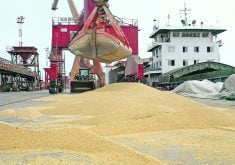SASKATOON — The Trump tariffs that Canada’s agriculture sector had been fearing for months could turn out to be a big competitive advantage, say industry officials.
U.S. President Donald Trump’s bark turned out to be worse than his bite.
Follow all our coverage of the tariffs situation here
Read Also

Trump’s tariffs take their toll on U.S. producers
U.S. farmers say Trump’s tariffs have been devastating for growers in that country.
On April 2 the White House announced that all goods covered by the Canada-United States-Mexico Agreement (CUSMA) would be exempt from tariffs.
That was a departure from Trump’s repeated threats to slap Canada and Mexico with an across-the-board 25 per cent tariff on that date.
Instead, 57 other exporting nations (83 when counting all European Union member states) are now facing new tariffs of up to 50 per cent entering the U.S. market.
That means Canada’s agri-food exporters will have a leg-up on exporters from those other nations when shipping into the U.S. market.
“There is always an opportunity in chaos,” said Wade Sobkowich, executive director of the Western Grain Elevator Association.
But it is difficult to predict exactly how that competitive advantage will play out due to the unrelenting uncertainty surrounding Trump’s tariffs.
“The message has been changing a lot, and it could still change,” he said.
“There’s still a lot of trepidation about how aggressively to book business and how far into the future to book business.”
Sobkowich noted that Canadian Prime Minister Mark Carney has mentioned that CUSMA needs to be renegotiated, which adds another twist and even more uncertainty to cross-border trade with the U.S.
The ramifications of Trump’s April 2 ‘Liberation Day’ announcement could also give Canadian agri-food exporters a leg-up in overseas markets due to their retaliatory tariffs.
For instance, China responded to Trump’s announcement by slapping a 34 per cent tariff on U.S. goods, causing U.S. soybean futures to plunge on April 4.
China had already imposed 10 to 15 per cent tariffs on US$20 billion of U.S. agricultural imports, including wheat and soybeans. And it had suspended the licenses of three U.S. soybean exporters.
U.S. wheat now faces a combined new 49 per cent tariff into the Chinese market, while soybeans will be hit with another 44 per cent, bringing its total to 71.5 per cent.
Those steep retaliatory tariffs can make Canadian agricultural products more competitive in markets where they compete head-to-head with U.S. goods.
But they also have the potential to hurt Canadian farmers. Nearby U.S. soybean futures fell below US$10 per bu. following Trump’s announcement and that is weighing down Canadian canola futures.
Sobkowich said while the U.S. tariffs and retaliatory tariffs by other countries “could and would” create opportunities for Canada’s exporters, his member companies would prefer a trade environment characterized by stability and predictability.
“There needs to be certainty that you can go ahead and execute on that business in the time period that you booked it for,” he said.
Michael Harvey, executive director of the Canadian Agri-Food Trade Alliance, echoed that sentiment.
“(Canadian) agri-food exporters got off very well compared to others,” he said.
“But the announcement (of tariffs) on others create an awful lot of uncertainty in the international trading environment.”
Harvey said almost all of Canada’s agri-food exports are covered by the CUSMA agreement and will not be touched by tariffs.
“To the extent that there are no tariffs on Canadian agri-food products and there are tariffs on the agri-food products of a lot of other countries, that gives us an advantage,” he said.
But he stressed that Trump’s tariffs were an attack on the global trading system and in the long-run that does not benefit an export-oriented sector like agriculture.
A similar message was delivered by Carney the day following Trump’s April 2 announcement.
“Yesterday’s actions by the U.S. administration, while not specifically targeting Canada, will rupture the global economy and adversely affect global economic growth,” he said.
“The global economy is fundamentally different today than it was yesterday.”
Carney said the system of global trade anchored by the U.S. that Canada has relied on since the end of the Second World War, and has delivered decades of prosperity, is over.
















